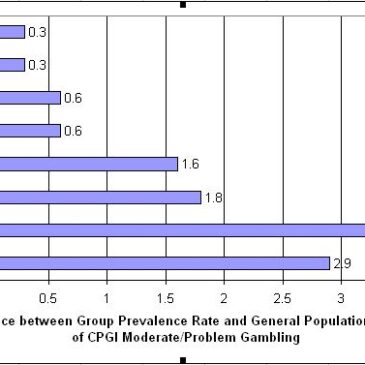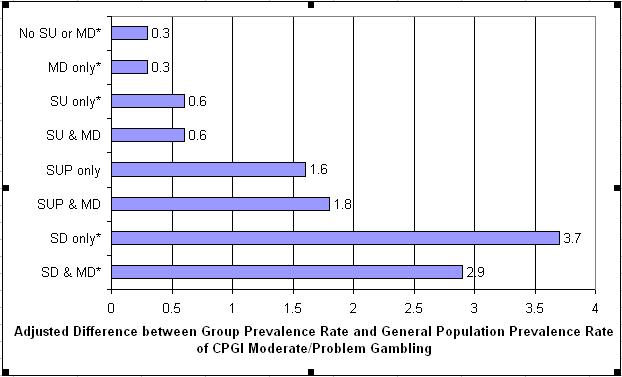Past research focusing on the co-occurrence of disordered gambling and other mental health disorders has left no doubt that significant overlap exists between disordered gambling and substance use, mood, and anxiety disorders (Crockford & el-Guebaly, 1998; Kessler et al., 2008; Petry, Stinson, & Grant, 2005). However, research has yet to uncover how disordered gambling interacts with substance use disorders and other mental disorders. This week the WAGER reviews a large Canadian study that investigates that interaction (Rush, Bassani, Urbanoski, & Castel, 2008).
Methods
- Canadian nationally representative survey employing face-to-face interviews (n = 36,885)
- Measures included the Problem Gambling Severity Index (PGSI: Ferris & Wynne, 2001) to measure past-year gambling problem severity (i.e., non-gambler/non-problem gambler [no endorsed problems], low risk gambler [1-2], and moderate risk/problem gambler [3+]), and the Composite International Diagnostic Interview (CIDI: Kessler & Ustun, 2004) to assess a subset of Axis I mental disorders (i.e., substance use disorders, major depressive disorder, mania, panic disorder, social phobia, and agoraphobia).
- For analysis, substance use disorders were collapsed across alcohol and drug use disorders to create four past-year categories: abstainers, non-problem users, problem users, and dependent users. Other mental disorders were collapsed into a single variable indicating presence or absence of any lifetime disorder.
Results
- The presence of lifetime mental disorders other than substance use disorders increased the prevalence of past-year moderate/problem gambling from 1.7% to 2.9%.
- The more severe the past-year substance use disorder, the higher the prevalence of past-year moderate/problem gambling – from 1.0-1.4% among abstainers to 9.1-9.6% among those with substance dependence.
- The relationship between past-year substance use disorders and past-year gambling problems was not affected significantly by the lifetime presence or absence of other mental disorders. See Figure 1.
Figure 1. Differences in Prevalence Rates of Moderate/Problem
Gambling among Participants with and without Substance Use Disorders
and Other Mental Disorders (adapted from Rush et al., 2008)
(Click image for clearer, enlarged picture)
* p < .05 – prevalence rate significantly different from that in the general population
Note: No difference between prevalence rates is reflected by a score of 1 in the Figure. An increased prevalence rate for a given group is reflected by a score above 1 and a decreased prevalence rate is reflected by a score below 1. Analyses controlled for age, gender, education, and region. MD = mental disorder; SU = substance use, not problematic; SUP = substance use problem, not dependence; SD = substance dependence.
Limitations
- The survey did not assess all Axis I disorders and the study collapsed these disorders into a single lifetime category.
- The study did not separately assess the impact of alcohol use and drug use disorders.
- The study was cross-sectional; conclusions about the etiology of these disorders and their causal relationships require longitudinal study.
Conclusion
Past year gambling problems appear to be more robustly associated with past-year substance use disorders than with lifetime presence of other mental disorders, and that association between gambling problems and substance use disorders appears unaffected by the lifetime presence of other mental disorders. This suggests that etiologically, gambling problems and substance use disorders are more closely related than gambling problems and other disorders; these other disorders might relate to problem gambling through their associations with substance use disorders or might predispose individuals to gambling problems and substance use disorders (see Kessler et al., 2008). Longitudinal research is needed to test this suggestion.
For more WAGER articles about comorbidity, please see:
The WAGER, Vol. 13(2) – Chickens, Eggs, and Psychiatric Comorbidity Among PGs
The WAGER Vol. 10(12) – Disordered Gambling and Psychiatric Comorbidity
What do you think? Comments can be addressed to Sarah Nelson.
References
Crockford, D. N., & el-Guebaly, N. (1998). Psychiatric comorbidity in pathological gambling: A critical review. Canadian Journal of Psychiatry, 43(1), 43-50.
Ferris, J., & Wynne, H. (2001). The Canadian Problem Gambling Index: Final Report. Ottawa, ON, Canada: Canadian Centre on Substance Abuse.
Kessler, R. C., Hwang, I., LaBrie, R. A., Petukhova, M., Sampson, N. A., Winters, K. C., et al. (2008). DSM-IV pathological gambling in the National Comorbidity Survey Replication. Psychological Medicine 38(9), 1351-1360.
Kessler, R. C., & Ustun, T. B. (2004). The World Mental Health (WMH) Survey Initiative version of the World Health Organization (WHO) Composite International Diagnostic Interview (CIDI). International Journal of Methods in Psychiatric Research, 13(2), 93-121.
Petry, N. M., Stinson, F. S., & Grant, B. F. (2005). Comorbidity of DSM-IV pathological gambling and other psychiatric disorders: Results from the National Epidemiologic Survey on Alcohol and Related Conditions. Journal of Clinical Psychiatry, 66(5), 564-574.
Rush, B. R., Bassani, D. G., Urbanoski, K. A., & Castel, S. (2008). Influence of co-occurring mental and substance use disorders on the prevalence of problem gambling in Canada. Addiction, 103, 1847-1856.






florida rehab April 27, 2009
That is true. Most of the Florida rehab patients have at some point becomes addicted to gambling as well. They thought gaining easy money to supply their needs for drugs. Not knowing that it even worsen their lifestyle condition.